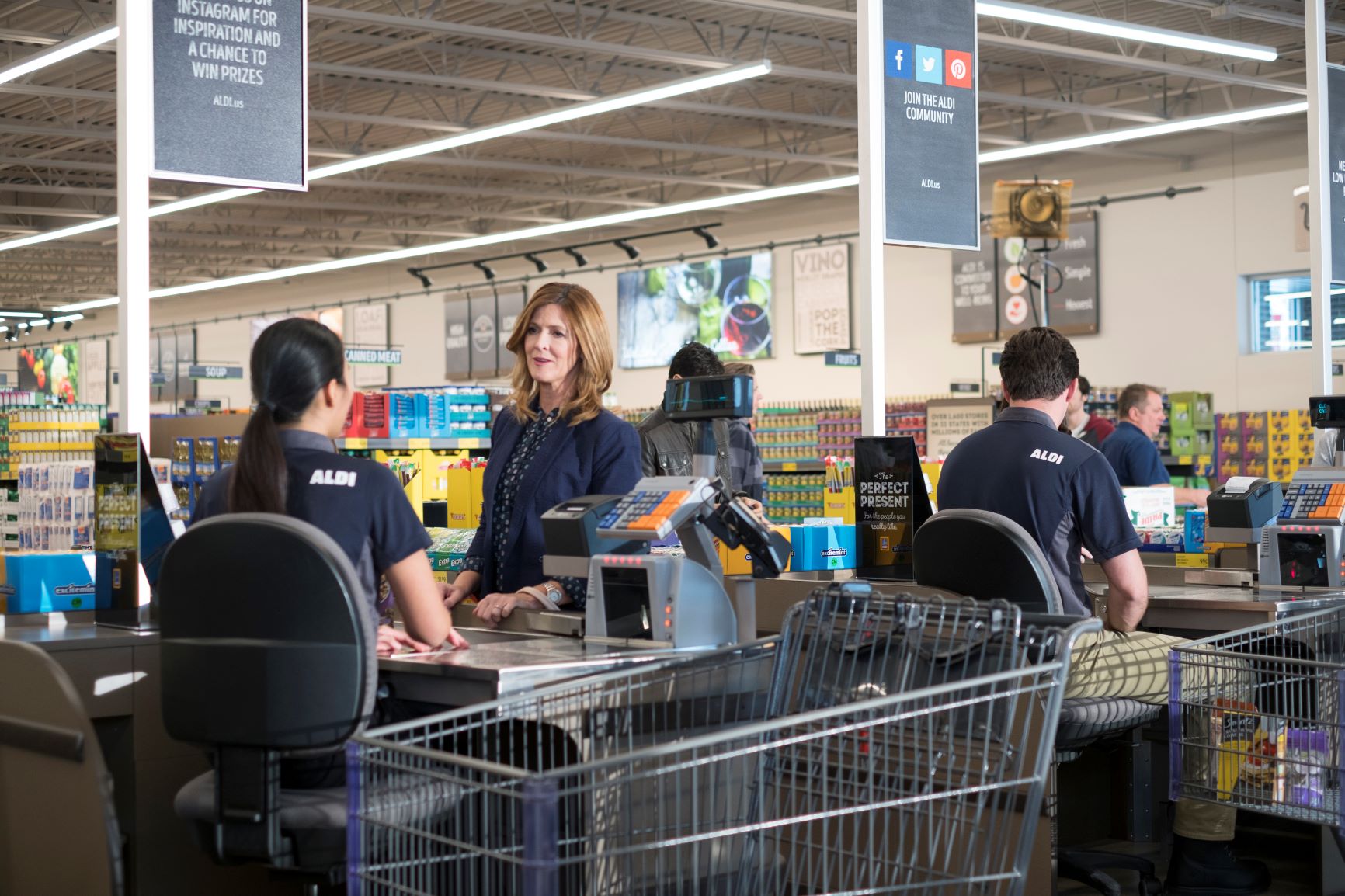
15 Jul California Workers Have A Legal Right to Reasonable Seating
Editor’s Note: Telluride welcomes blog submissions from associates about issues they care about and would like to share their personal perspectives on.
By Annia Koroliak SP04
This week, news broke that grocery store workers in Southern California are preparing to strike.
As these workers get ready to leverage their collective voice, there’s an important workplace protection they should know about: the right to be able to sit while at work.
Yes — the right to be able to sit!

One grocery chain in the U.S. has offered cashiers seating for over a decade by default. Photo credit: Aldi Store Corporate Images
In California, we have a long-established right for employees who do stationary work to be entitled to seating at work. It’s IWC Wage Order 4-2001, Sec. 14. Wonks of employment law can read over more of its details: https://www.natlawreview.com/article/take-seat-california-supreme-court-provides-clarity-california-s-suitable-seating.
While “Suitable Seating” doesn’t get a lot of attention, this policy has been upheld repeatedly by California courts in numerous class action suits. Just a few months ago, Walmart reached a significant settlement — $65 million — for failing to inform its cashiers of their right to be able to take a seat while working. Walmart must now provide information about the law and seating to employees. Likewise, in the last several years, other large retailers have also reached settlements — Bank of America is required to inform its tellers and provide seats; CVS is in the middle of pending litigation; Target settled a class action suit.
There’s even a state agency already well-funded to oversee Suitable Seating outreach and enforcement. California’s Labor Workforce and Development Agency received 75% of the $65 million paid by Walmart in the recent settlement to do its part to help workers know about their right.
It’s simple. Our employees deserve a right to be seated during jobs where that is reasonable. Not just pregnant employees. All employees.
And yet, few do.
Notably, one grocery store already provides seating to cashiers all on its own: this is ALDI, a grocery store chain new to San Diego, but already extremely popular in regions in the American Midwest and in Europe.
However, while some big-name corporate employers are starting to comply by providing suitable stools or other seating to stationary workers like tellers, others simply ignore it. Because the norm of standing workers predominates in the US, companies seem unwilling to comply. Even when official notices of the law are issued, it’s common for managers to informally pressure workers, who are scared to “rock the boat” and lose their jobs, to ignore their right.
Once I started talking to cashiers and paying attention, I was shocked. One woman in her twenties working as a cashier in a small “Fro-Yo” shop was limping from a recent ankle injury. She could not put pressure on her left foot and hopped about rather than walking — but when another customer and I shared that she was legally entitled to ask for a chair or a stool, she clearly felt “rocking the boat” would get her swiftly dismissed, and preferred to spend all day standing, gritting her teeth through pain from her injury. “I don’t want to cause trouble,” she said.
On another recent occasion, I mentioned this same right to a sales assistant, a woman in her 30s or 40s, at a Nordstrom accessories counter. As we chatted, she mentioned that she often had pain “shooting from her heels up her legs,” and that other colleagues did as well. I left her with a phone number for one attorney’s office that has tried similar cases in the past. On my way out, I noticed, grimly, a prominent display shelf showcasing a plethora of orthotics: cushioning shoe inserts to relieve foot pain.
Cashiers and bank tellers are not the only ones up against implacable corporate behemoths. Even higher-status pharmacists at CVS stores clearly feel they cannot “rock the boat” by asserting this right. One pharmacist at a CVS within a Target asked for a stool after being notified by corporate management of this right. Her access to seating during her full-time shifts lasted only a week; her male supervisor preferred to stand and tacitly indicated she should continue to do the same. Weighed down with professional school debt and reluctant to ruffle feathers, even the highly educated professional chose to yield to her supervisor’s hints to override the law protecting her.
There are important reasons why we should insist that companies follow the law: standing all day, every day, prevents many individuals from being able to do their work without pain.

Peripheral Artery Disease is just one of many conditions that can make standing full-time every day painful. Photo credit: blog.garymoller.com.
Standing all day, everyday, affects older and disadvantaged workers most. For instance, older and low-income women, even those who are relatively young or middle aged, develop Peripheral Artery Disease — termed “poor circulation” — a serious condition in its advanced stages that causes considerable pain and makes extended standing extremely difficult. This is just one condition that seems minor to younger or affluent people but can dramatically impact the ability of older, low-income people to work full-time as a cashier.
So as Southern California grocery store workers prepare to stand up for their workplace rights, I hope they are aware of IWC Wage Order 4-2001, Sec. 14, the little-known “Right to Suitable Seating” California judges have defended for well over a decade. Being forced to stand needlessly creates an impediment to older people seeking to work — and that’s just not something any of us should stand for. For some, this right to take a seat may be just as valuable as a bump in hourly pay.
Annia Koroliak has contributed to work expanding access to Suitable Seating in California since 2018.

Lessie Shockley-Harrison
Posted at 01:16h, 09 AprilI would like to know where I can get a chair like the chair at Aldi’s I’m a cashier and I have a back injury and knee injury
trail
Posted at 10:34h, 12 AprilDear Lessie, I’m sorry that I don’t have a ready answer for you. If you have a union or HR representative, I would check with them first? If you’re in California, you might check with the California Labor Workforce and Development Agency referenced in the article. Other states may have similar agencies. Best of luck to you.